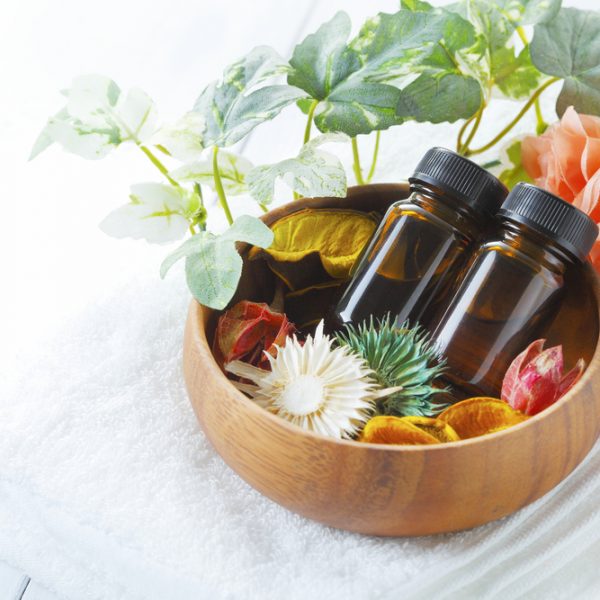The use of essential oils (EOs) is fairly mainstream today. They are viewed as easy self-care tools and readily available almost no matter where you look (although not all the same quality). While many use them for the simple reason that they smell amazing, EOs are also therapeutic. Essential oils can be a wonderful addition to a natural fertility program, yet their ability to shift hormonal balance is something we’ve yet to learn enough about to suggest their use alone. I’d like to shed a little more light on essential oils and hormonal balance here. I hope this Q&A is helpful!
Q1: When is the best time during each cycle to use each oil [essential oil]? I have Geranium, Clary Sage, Lemon, Thyme and Fennel.”
A: Each oil can be used throughout the menstrual cycle when preparing for conception. Unless you are working one on one with an aromatherapist or midwife trained in essential oil use, Geranium, Clary Sage, Thyme and Fennel are best not used after ovulation when you begin actively trying to conceive. These essential oils are not intended for use in pregnancy and because our hope is that you have conceived and are pregnant during the two-week wait, we have to suggest they be stopped at ovulation. Lemon is so uplifting and such a fresh scent. It is a gentle essential oil and may be fine in moderation to diffuse into the air or clean with while trying to conceive, but continue to do your research to decide if this is right for you.
Q2: As I understood it, Thyme is for progesterone, so wouldn’t this one be useful during the 2-week wait?”
A: First, I want to share that thyme essential oil is most notably known for its antiseptic, antibacterial, antimicrobial, and antioxidant properties. This is primarily how I see it promoted. There are web resources sharing that it helps the body improve production of progesterone. This isn’t completely truthful, I don’t think. Thyme essential oil is not known to nourish the endocrine system (the body system responsible for the production of and coordination of the delivery of most hormones) and does not help the ovaries (corpus luteum after ovulation), testes, adrenal glands, or placenta (in pregnancy) produce/make progesterone.
Thyme, Fennel, and many other whole plants (Nutmeg, Cloves, Turmeric, Cumin, etc.) are plant sources of phyto-progestins or plant progestins and have a progesterone-binding capacity. This means they have the potential to act as progesterone when ingested and used by the body – and have the ability to interact with the body’s naturally produced progesterone only by way of binding to progesterone receptor sites. This is not necessarily a bad thing, particularly if one has low progesterone. It may be counterproductive if one’s progesterone levels are too high or elevated.
With that, thyme is one of the six highest progesterone-binding herbs and spices commonly consumed according to one study published in the journal Society for Experimental Biology and Medicine, yet 2 grams (g) of the whole herb provides approximately 4 micrograms (mcg) plant progesterone. One would need to consume a lot of the whole thyme plant to significantly impact progesterone levels. Further, I have yet to see sound evidence that suggests using the whole herbs and spices named here (in moderation) in cooking or as medicine have the potential to impact hormonal balance.
So, about when to use Thyme essential oil to support hormonal balance and healthy progesterone levels, if it has been determined through testing that your levels are low, we still are only able to suggest its use before ovulation when actively trying to conceive. Our hope is that in the two-week wait you have conceived and because it is best to only use essential oils in pregnancy under the supervision of a practitioner trained in their use, we cannot make a blanket statement about essential oil safety during this time. Consider continuing your research with a reputable resource like the National Association for Holistic Aromatherapy or consult an aromatherapist near you.
There are more well-known, clinically-proven ways to naturally support healthy progesterone levels, that are perhaps more reliable than essential oils, that we share in our Progesterone Fertility Guide.
Q3: “Can I take the utericalm with essential oils (i.e. balance and clary calm) on a medicated cycle?”
A: First, Fertilica UteriCalmTM could be considered while also using essential oils (EOs) in preparation or before beginning the medicated cycle. UteriCalm alone can be considered during a medicated cycle with the approval of your healthcare provider. This formula has no herbs in it that impact hormone balance.
Essential oil blends designed to support hormonal balance (as well as herbs intended to do the same) should be discontinued prior to beginning a medicated fertility cycle (IVF being one example). If you are currently already on fertility medications or undergoing a procedure, it is best not to combine herbs and EOs with your medications. Herbs and EOs that act on the hormonal system could affect how your medications are working and we don’t want anything to interfere with the expensive, emotion-filled procedure. If you have not yet begun your medicated cycle and are taking herbs or using EOs to support healthy hormonal balance, they are best discontinued two weeks prior to beginning the procedure.
We have several resources on how to support yourself through medicated fertility cycles. If you would like support or to see them, reach out to us here…
For additional information on essential oils for fertility, these resources can help:
Aromatherapy for Fertility
How to Enhance the Benefits of Castor Oil with Essential Oils
Increasing Fertility Through the Use of Essential Oils
Herbal Fertility Massage Oil – Nurturing the Reproductive System
- Ruper, S. (2012, Jan. 21). What progesterone blockers do you eat? Tumeric, thyme, oregano, camomille, and other “phyto-progestins”. Retrieved from: http://paleoforwomen.com/tumeric-thyme-oregano-camomille-and-other-progesterone-antagonists-or-phyto-progestins/
- Zava, D. T., Dollbaum, C. M., & Blen, M. (1998). Estrogen and Progestin Bioactivity of Foods, Herbs, and Spices. Experimental Biology and Medicine, 217(3), 369-378. doi:10.3181/00379727-217-44247. Retrieved from: https://journals.sagepub.com/doi/abs/10.3181/00379727-217-44247





